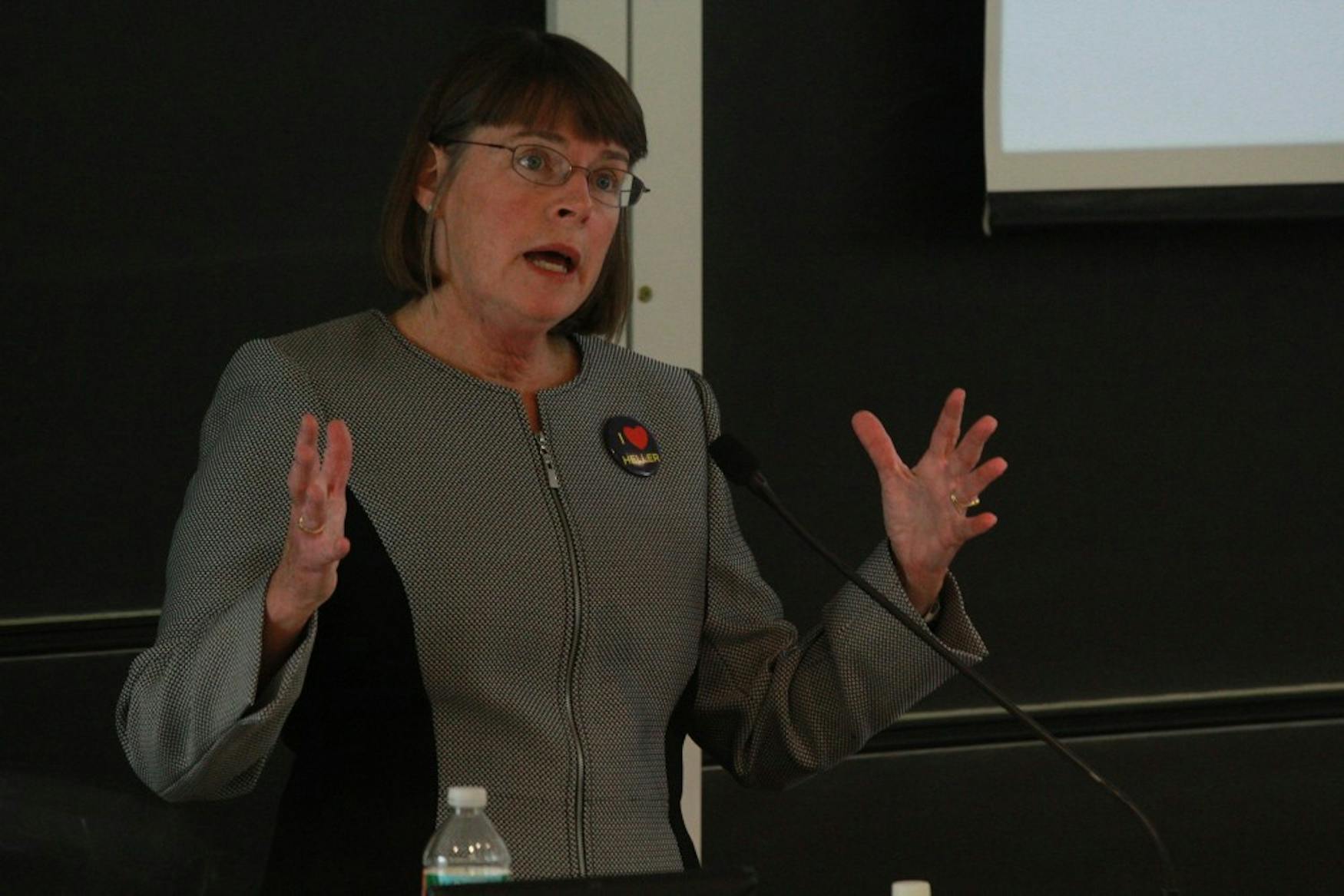An afternoon with the future provost
Lisa Lynch, dean of the Heller School for Social Policy and Management, discusses labor economics and her new position
“This isn’t where I thought I was going to be, looking back just four months ago,” remarked Lisa Lynch, reflecting on her recent appointment to become the next University provost.
Lynch is set to assume the provostship on Oct 29. She will continue to serve as the dean of the Heller School for Social Policy and Management, a position she has occupied for the past six years.
An expert in economics, Lynch brought her knowledge of the subject to her positions of dean and faculty member at Heller. Tuesday Talks, a series sponsored by Heller that allows professors to present their research in their respective fields to their colleagues and students, gave Lynch a platform from which to demonstrate her expertise to the wider Brandeis community. This past Tuesday, Oct. 7, Lynch participated in the series and spoke about her study of labor markets.
Her presentation, titled “Labor Economics Research in Monetary Policy and Decision Making,” reflected on her time as chair of the board of directors for the Federal Reserve Bank of Boston.
“There were days when I felt like I was more of an anthropologist than an economist,” said Lynch, speaking to the fact that the full impacts of the Federal Reserve system’s monetary policies are not fully realized until months after being instituted. Members of the Fed often try to predict future economic behavior to determine the outcomes of these policies. Serving at the Boston Fed at the height of the recession in 2008 and 2009, Lynch noted that the economic implications of the policy decisions she was involved in making were magnified during that time.
During the next part of her discussion, Lynch clarified that the Federal Reserve System is unique in comparison to central banks in other countries due to its dual mandate. While most central banks are dedicated to maintaining stable prices in the economy, she noted that the U.S. Federal Reserve System concerns itself with both national price levels and maintaining high levels of employment.
Lynch recalled one particular instance as a member of the Fed during an annual economic policy symposium in Jackson Hole, Wyo., when she and other members convened to discuss the prospects of future policies.
According to Lynch, a vast crowd of protesters showed up at the resort to voice their concerns regarding the potential of rising interest rates. “Janet Yellen, one of my professors at the London School of Economics and current Chair of the Federal Reserve went right up to them and said, ‘We understand the issues that you’re talking about and we’re doing everything we can.’” These policies clearly matter to the public.
The next portion of the discussion analyzed how factors such as wages and labor force participation rates are critical for determining the full level of national employment.
However, Lynch observed that this so-called “level” is highly ambiguous. She reiterated that one must attempt to predict future economic behavior to be able to translate previous trends of employment levels into future ones.
One notion that Lynch focused on, pertinent to current issues of national employment, is the concept of creative destruction. The concept details how old jobs are replaced by more efficient and less expensive innovations that put employees out of work.
“Technology seems to hamper ‘middle class jobs,’ replacing labor that performed routine tasks,” Lynch said.
Although technology has not quite replaced tasks concentrated in high manual labor or “lower class jobs,” according to Lynch’s estimates technology does account for slightly less than half of the increasing levels of wage inequality in today’s economy.
“Technology is a really important factor, but other trends that we see, including a decline in the real minimum wage and the decreasing amount of unionization, are also considerable factors that heighten the wage disparity,” Lynch said.
Lynch then went on to talk about how the decrease in unionization—the amount of workers whose wages are negotiated by labor unions—is one indicator of deteriorating employer-employee relationships. Lynch discussed that, in today’s labor market, the relationships between employers and employees have become more distant because an increasing number of jobs do not require physical interaction at the workplace.
Lynch likened today’s labor market to Amazon’s “Mechanical Turk,” a marketplace for certain tasks that workers can complete from the confines of their home. However, these workers are not guaranteed compensation by Amazon, and they have little control over their job security. Lynch explained that these are the same characteristics one observes in the overall labor market.
“The bargaining powers of workers are changing in a fundamental way,” said Lynch, which explains why labor income inequality continues to widen. Many workers lack job security and maintain poor bargaining positions in relation to their wages.
Lynch took some time during her presentation to reflect on her continued presence at Heller.
“As a University administrator, I have the best job in the whole wide world,” noted Lynch, who expressed enthusiasm for maintaining her faculty position at Heller.
One trait that Lynch will bring to the provostship is her understanding of the importance of interacting with the student body. According to Lynch, “one can only understand an institution by meeting and engaging with students.”



Please note All comments are eligible for publication in The Justice.